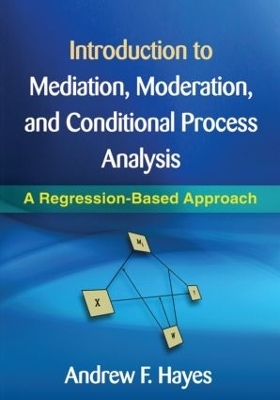
Introduction to Mediation, Moderation, and Conditional Process Analysis, First Edition
Guilford Publications (Verlag)
978-1-60918-230-4 (ISBN)
- Titel gebraucht verfügbar
- Artikel merken
Unique features include:
*Compelling examples (presumed media influence, sex discrimination in the workplace, and more) with real data; boxes with SAS, SPSS, and PROCESS code; and loads of tips, including how to report mediation, moderation and conditional process analyses.
*Appendix that presents documentation on use and features of PROCESS.
*Online supplement providing data, code, and syntax for the book's examples.
Andrew F. Hayes, PhD, is Professor of Quantitative Psychology at The Ohio State University. His research and writing on data analysis has been published widely. Dr. Hayes is the author of Introduction to Mediation, Moderation, and Conditional Process Analysis and Statistical Methods for Communication Science, as well as coauthor, with Richard B. Darlington, of Regression Analysis and Linear Models. He teaches data analysis, primarily at the graduate level, and frequently conducts workshops on statistical analysis throughout the world. His website is www.afhayes.com.
I. FUNDAMENTAL CONCEPTS
1. Introduction
1.1. A Scientist in Training
1.2. Questions of Whether, If, How, and When
1.3. Conditional Process Analysis
1.4. Correlation, Causality, and Statistical Modeling
1.5. Statistical Software
1.6. Overview of this Book
1.7. Chapter Summary
2. Simple Linear Regression
2.1. Correlation and Prediction
2.2. The Simple Linear Regression Equation
2.3. Statistical Inference
2.4. Assumptions for Interpretation and Statistical Inference
2.5. Chapter Summary
3. Multiple Linear Regression
3.1. The Multiple Linear Regression Equation
3.2. Partial Association and Statistical Control
3.3. Statistical Inference in Multiple Regression
3.4. Statistical and Conceptual Diagrams
3.5. Chapter Summary
II. MEDIATION ANALYSIS
4. The Simple Mediation Model
4.1. The Simple Mediation Model
4.2. Estimation of the Direct, Indirect, and Total Effects of X
4.3. Example with Dichotomous X: The Influence of Presumed Media Influence
4.4. Statistical Inference
4.5. An Example with Continuous X: Economic Stress among Small Business Owners
4.6. Chapter Summary
5. Multiple Mediator Models
5.1. The Parallel Multiple Mediator Model
5.2. Example Using the Presumed Media Influence Study
5.3. Statistical Inference
5.4. The Serial Multiple Mediator Model
5.5. Complementarity and Competition among Mediators
5.6. OLS Regression versus Structural Equation Modeling
5.7. Chapter Summary
III. MODERATION ANALYSIS
6. Miscellaneous Topics in Mediation Analysis
6.1. What About Baron and Kenny?
6.2. Confounding and Causal Order
6.3. Effect Size
6.4. Multiple Xs or Ys: Analyze Separately or Simultaneously?
6.5. Reporting a Mediation Analysis
6.6. Chapter Summary
7. Fundamentals of Moderation Analysis
7.1. Conditional and Unconditional Effects
7.2. An Example: Sex Discrimination in the Workplace
7.3. Visualizing Moderation
7.4. Probing an Interaction
7.5. Chapter Summary
8. Extending Moderation Analysis Principles
8.1. Moderation Involving a Dichotomous Moderator
8.2. Interaction between Two Quantitative Variables
8.3. Hierarchical versus Simultaneous Variable Entry
8.4. The Equivalence between Moderated Regression Analysis and a 2 × 2 Factorial Analysis of Variance
8.5. Chapter Summary
9. Miscellaneous Topics in Moderation Analysis
9.1. Truths and Myths about Mean Centering
9.2. The Estimation and Interpretation of Standardized Regression Coefficients in a Moderation Analysis
9.3. Artificial Categorization and Subgroups Analysis
9.4. More Than One Moderator
9.5. Reporting a Moderation Analysis
9.6. Chapter Summary
IV. CONDITIONAL PROCESS ANALYSIS
10. Conditional Process Analysis
10.1. Examples of Conditional Process Models in the Literature
10.2. Conditional Direct and Indirect Effects
10.3. Example: Hiding Your Feelings from Your Work Team
10.4. Statistical Inference
10.5. Conditional Process Analysis in PROCESS
10.6. Chapter Summary
11. Further Examples of Conditional Process Analysis
11.1. Revisiting the Sexual Discrimination Study
11.2. Moderation of the Direct and Indirect Effects in a Conditional Process Model
11.3. Visualizing the Direct and Indirect Effects
11.4. Mediated Moderation
11.5. Chapter Summary
12. Miscellaneous Topics in Conditional Process Analysis
12.1. A Strategy for Approaching Your Analysis
12.2. Can a Variable Simultaneously Mediate and Moderate Another Variable’s Effect?
12.3. Comparing Conditional Indirect Effects and a Formal Test of Moderated Mediation
12.4. The Pitfalls of Subgroups Analysis
12.5. Writing about Conditional Process Modeling
12.6. Chapter Summary
Appendix A. Using PROCESS
Appendix B. Monte Carlo Confidence Intervals in SPSS and SAS
| Erscheint lt. Verlag | 14.6.2013 |
|---|---|
| Reihe/Serie | Methodology in the Social Sciences |
| Verlagsort | New York |
| Sprache | englisch |
| Maße | 178 x 254 mm |
| Gewicht | 1102 g |
| Themenwelt | Geisteswissenschaften ► Psychologie |
| Medizin / Pharmazie ► Pflege | |
| Sozialwissenschaften ► Pädagogik ► Erwachsenenbildung | |
| Sozialwissenschaften ► Soziologie | |
| Wirtschaft ► Volkswirtschaftslehre ► Ökonometrie | |
| ISBN-10 | 1-60918-230-8 / 1609182308 |
| ISBN-13 | 978-1-60918-230-4 / 9781609182304 |
| Zustand | Neuware |
| Informationen gemäß Produktsicherheitsverordnung (GPSR) | |
| Haben Sie eine Frage zum Produkt? |
aus dem Bereich




